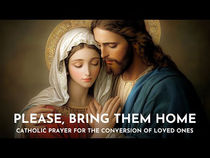Eucharistic Miracle of Ferrara Italy 1171
- Dec 30, 2019
- 3 min read

"Now as they were eating, Jesus took bread, and blessed, and broke it, and gave it to the disciples and said, 'Take, eat; this is my body.' And he took a cup, and when he had given thanks he gave it to them, saying, 'Drink of it, all of you; for this is my blood of the covenant, which is poured out for many for the forgiveness of sins.'" (Mt. 26:26-28) Share please, Jesus is talking to us in Scripture, and his Miracles he shows us in love for our souls. To Jesus through Mary, GregoryMary
This Eucharistic miracle took place in Ferrara, in the Basilica of Saint Mary in Vado, on Easter Sunday, March 28, 1171. While celebrating Easter Mass, Father Pietro da Verona, the prior of the basilica, reached the moment of breaking the consecrated Host. At this point he saw that Blood gushed from the Host, staining the ceiling of the crypt above the altar with droplets. In 1595 the crypt was enclosed within a small shrine and is still visible today in the monumental Basilica of Santa Maria in Vado.
On March 28, 1171, the prior of the Canons Regular Portuensi, Father Pietro da Verona, was celebrating Easter Mass with three confreres (Bono, Leonardo and Aimone). At the moment of the breaking of the consecrated Host, Blood gushed forth from the Host and threw large drops on the ceiling of the small crypt above the altar.

Histories tell of the “holy fear of the celebrant and of the immense wonder of the people who crowded the tiny church.” There were many eyewitnesses who told of seeing the Host take on a Bloody color and having seen in the Host the figure of a Baby.
Bishop Amato of Ferrara and Archbishop Gherardo of Ravenna were immediately informed of the event. They witnessed with their own eyes the miracle, namely “the Blood which we saw redden the ceiling of the crypt.” The church immediately became a pilgrim destination, and later was rebuilt and expanded on the orders of Duke Ercole d’Este beginning in 1495.
There are many sources regarding this miracle. Among the most important is the Bull of Pope Eugene IV (March 30, 1442), in which the pontiff mentions the miracle in reference to the testimonies of the faithful and ancient historical sources.

The 1197 manuscript of Gerardo Cambrense, conserved in Canterbury’s Lambeth Library is the oldest document that mentions the miracle. The miracle received recent attention in the “Gemma Ecclesiastica” (Budding of the Church) by historian Antonio Samaritani.
Another document which dates to March 6, 1404, is the Bull of Cardinal Migliorati, in which he grants indulgences to “those who visit the church and adore the Miraculous Blood.” Even today, on the 28th day of every month in the basilica, which is currently under the care of Saint Gaspare del Bufalo’s Missionaries of the Most Precious Blood, Eucharistic Adoration is celebrated in memory of the miracle. And every year, in preparation for the Feast of Corpus Christi, the solemn Forty Hours devotion is celebrated. The eighth centenary of the miracle was celebrated in 1971.
Eucharistic Quote:

"And according as we say, "Our Father," because He is The Father of those who understand and believe; so also we call it "our Bread," because Christ is The Bread of those who are in union with His Body. And we ask that this Bread should be given to us daily, that we who are in Christ, and daily receive The Eucharist for the Food of Salvation, may not by the interposition of some heinous sin...be separated from Christ's Body."
- St. Cyprian (210?-258)
When we say "Give us this day our daily bread," by "this day" we mean "at this time," when we either ask for that sufficiency, signifying the whole of our need under the name of bread, which is the outstanding part of it, or for the sacrament of the faithful, which is necessary at this time for attaining not so much this temporal as that eternal happiness."
- St. Augustine
"It is happiness to be in heaven, no doubt, because it is to be with Jesus; but have we not almost the same happiness here? Do we not possess Him in the Most Holy Sacrament? Did we but know how to profit by His Divine Presence, we should in some way have no reason to envy the inhabitants of the Heavenly City."
- Marie Estelle Harpain (1814-1842)




















Comments